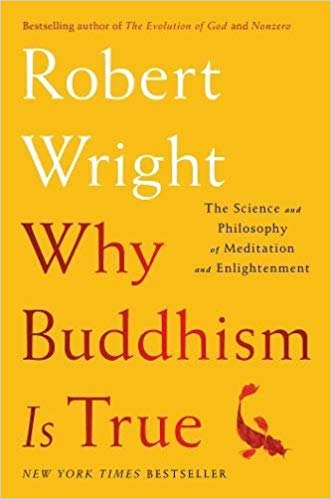Robert Wright – Why Buddhism is True Audiobook
Robert Wright – Why Buddhism is True Audiobook

As Wright sees it, ‘The Fact’ of the human condition is to be discovered in natural selection, as described through transformative psychology in his very early book The Moral Animal: Why We Are, the Way We Are: The New Science of Evolutionary Psychology. And he suggests that this reality is distinctively addressed by ‘The Means’ of Buddhism, or at the very least naturalistic Buddhism. This ‘nonreligious Buddhism’ is Buddhism without reincarnation, spirits or gods. Why Buddhism is True Audiobook Free. Also the idea of full or long lasting enlightenment is held at arms size.
Secular, naturalistic Buddhism rests on a few crucial suggestions: the idea that individuals do not have a crucial ‘self’ (no-self), the concept that discontentment (dukkha) is caused by the ‘hedonic treadmill’ of search of enjoyment and also avoidance of discomfort, and that reflection can help us to get off this treadmill. The thoughtful approach is similar to that of Stephen Batchelor in Admission of a Buddhist Atheist as well as Secular Buddhism: Imagining the Dharma in an Uncertain World.
There is a distinctly Gnostic bent to the composing right here, right from the beginning, when the motion picture The Matrix is pointed out. Right here natural selection is the process which holds us in a state of deception, warps our perceptions of reality, avoids us from experiencing long lasting satisfaction and also satisfaction, and also keeps us trapped on the hedonic treadmill. And secular-Buddhism is The Means (the ‘red pill’) that will liberate us from this unlimited dramatization of delusion and disappointment. This sight of advancement stands in significant contrast keeping that of Wright’s previous publication, The Advancement of God (Back Bay Visitors’ Select), in which organic as well as social advancement are rather ‘divine’ processes through which the Excellent comes to be manifest in the world. (The God-as-Evolution sight is additionally that of the ‘Integral’ spirituality of Ken Wilber, Steve McIntosh, and also others.).
Part of this book is dedicated to revealing that the key ideas of secular-Buddhism are medically true, through conversation of researches in psychology and neuroscience (a technique showed to Getting up: An Overview to Spirituality Without Religion, by Sam Harris). This would certainly be extra persuading if the researches were pointed out as a way of evaluating Buddhism versus competing concepts of health, such as modern positive psychology, yet the book generally prevents this type of direct contrast. This is reflective of the fundamental method of secular-Buddhism: the concepts which do not discover assistance in clinical studies, such as reincarnation, or lasting enlightenment, are abandoned or minimized. Secular-Buddhism is reformulating Buddhism to be more regular with modern psychology, a dynamic which complicates the question of whether scientific research can be utilized to show that ‘Buddhism holds true’.
Wright increases on the principle of ‘no-self’ by offering a ‘modular’ design of the mind. The concept is that our mind is composed of components with different objectives, needs, as well as thought patterns. The components scramble and take on each other on the subconscious level. Just when among them carries a sufficiently strong feeling, do we then become aware of its associated idea on an aware level. While Wright discovers some assistance for this modular model from the Insight Meditation college, and also from mental research, he creates it via his own recommended viewpoint of transformative psychology (Darwinian competitors within the subconscious mind). Surprisingly, the version is reached suggest how mindfulness can boost our ‘self’- control, as well as to weaken the pull of indulgent or addicting habits.
One of the enjoyments of The Advancement of God was its in-depth historical instances of the methods which the ‘spiritual market’ of competing suggestions, and also the needs of sellers, kings, and also leaders all affected the growth of old Judaism, Christianity, as well as Islam. Wright might have also taken this method with Buddhism, exploring how its history as the state religion of multiple realms has actually formed its advancement in time as well as area. I was expecting this, and am dissatisfied not to discover it here. Nevertheless, Wright instead takes care of to deal with some rather subtle philosophical issues, such as the distinction between the Buddhist idea of ’em ptiness’ (sunyata) and Hindu non-dualism, in a way that is unusually available. He perks up the discussion with narrative accounts of previous discussions and meetings.
This publication remains in several means a personal account: Wright has located a version of secular-Buddhism that is True for him in his life, and he is bringing us along through his experience and assumed procedure. Unlike lots of writers on Eastern spirituality, he is in no way attempting to present himself as enlightened, or a spiritual teacher or master. He is refreshingly plain– humorously self-effacing, and also clear regarding his motivations for composing. Robert Wright – Why Buddhism is True Audio Book Download. As well as he is a clear writer– he does not try to daunt us with obtuseness and mystery, also when addressing difficult concepts. The book is not constantly convincing, however it is involving, friendly, and thought-provoking.